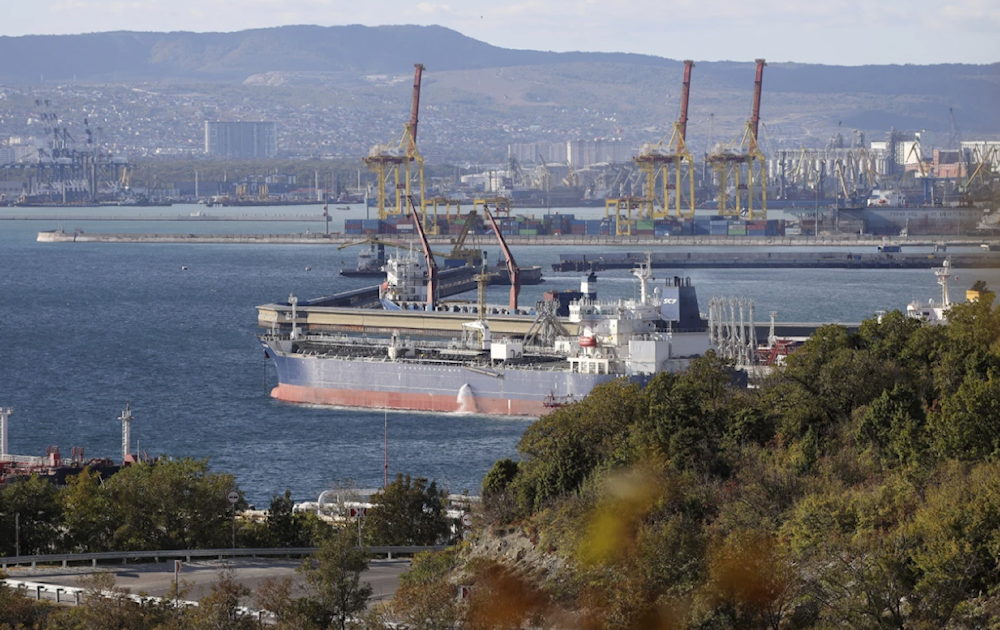Western insurers admit Russian oil price cap not working
The cap permits Western shippers and insurers to engage in Russian oil trade as long as oil is sold for less than $60 per barrel.
-

An oil tanker is moored at the Sheskharis complex, part of the Chernomortransneft JSC, a subsidiary of Transneft PJSC in Novorossiysk Russia on October 11, 2022 (AP)
A group of Western insurers has stated that a Russian oil price ceiling has become unenforceable, forcing more ships to join a shadow fleet, in one of the toughest rebukes to the move intended to reduce income to the Kremlin.
The G7 adopted a price ceiling for Russian oil after Washington campaigned to limit the Kremlin's earnings during the war in Ukraine while keeping Russian oil flowing to avert an energy price surge.
The cap permits Western shippers and insurers to engage in Russian oil trade as long as oil is sold for less than $60 per barrel.
Read more: Russian energy exports grew in 2022 despite sanctions, embargo
According to the International Group of P&I Clubs, the price cap has had little effectiveness since its implementation two years ago, as Russia allegedly has turned to its own fleet, as well as ships that are not subject to Western monitoring.
The declaration was presented as written evidence before a UK parliamentary committee on Tuesday.
The association claims to include 12 marine third-party liability insurers that cover 87% of the world's ocean-going tonnage.
The statement reveals that "The oil price cap appears increasingly unenforceable as more ships and associated services move into this parallel trade. We estimate around 800 tankers have already left the International Group Clubs as a direct result of the introduction of the oil price cap."
US and EU officials believe the price cap was successful in reducing Russia's earnings while keeping oil flowing and averting a price shock.
The US Treasury's enforcement of the price ceiling has restricted the number of ships prepared to carry Russian petroleum, hindering Russia's efforts to sell it and profit from it.
Tom Keatinge, head of the Royal United Services Institute's Centre for Finance and Security, told the panel that "within the reach of the UK and the G7, there are insurers who are providing insurance that is in breach of the oil price cap."
"These are names that should be being added to the sanctions list and should be drawn to the attention of the international community that dealing with that particular insurance company is going to get you into hot water," he said, without mentioning any specific companies.
EU pleads Russia not sanction them after sanctioning it for years
The European External Action Service (EEAS) called on Moscow on Saturday to overturn its decision regarding the transfer of subsidiaries belonging to German and Italian companies to Gazprom's management despite the EU wanting to use Russia's frozen funds as if they were their own.
Russian President Vladimir Putin signed a decree on Friday mandating the transfer of Russian subsidiaries of Italy's Ariston and Germany's BSH Hausgeraete to the temporary management of Gazprom Household Systems, a subsidiary of the Gazprom group.
Expressing the EU's ironic disapproval, the EEAS emphasized the necessity for Russia to reconsider its actions and engage in dialogue with the affected European companies.
"The European Union calls on Russia to reverse these measures and seek acceptable solutions with European companies targeted by them," the EEAS said in a statement.
This comes at a time when Russia's assets have been frozen by the EU and its economy sanctioned relentlessly for years.
Although Russia has been taking drastic countermeasures since the sanctions started befalling it, the EU possibly only realized that its sanctions were backfiring mere months ago.

 4 Min Read
4 Min Read









